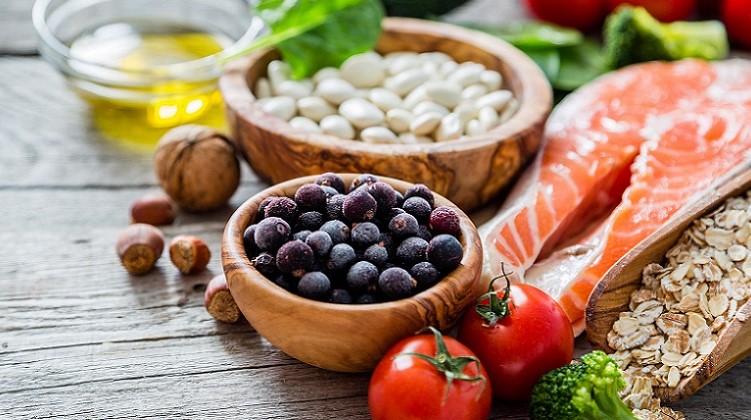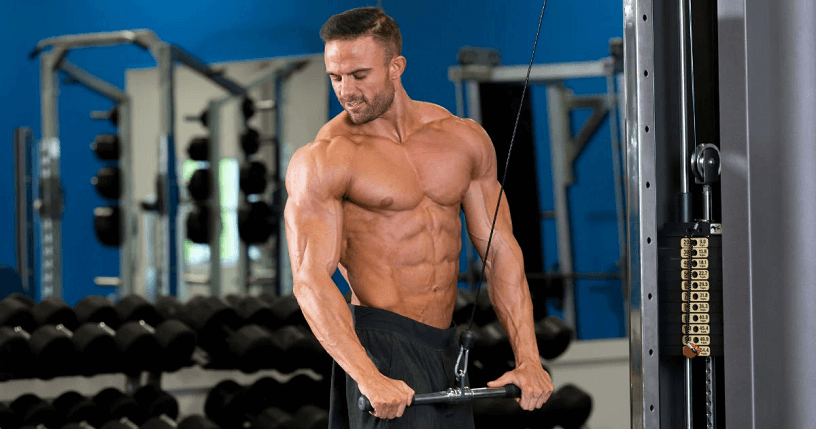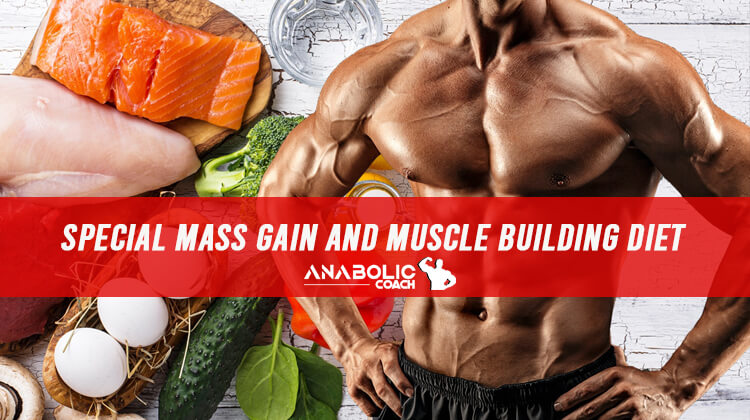Muscle building is not all about having a structured workout program that involves resistance, weight, strength, or high-interval intensity training (HIIT). Indeed there is more to gaining muscle mass than just lifting heavy.
Muscle building also involves incorporating sufficient recovery time after each training session, as this is when your trained muscle tissues are able to repair themselves and increase your muscle mass in the process.
But in addition to rest and recovery, you need to properly articulate a mass gain diet plan. This nutrition program will be designed to provide your skeletal muscles with the protein needed for regeneration and growth.
It will also be structured to boost your energy levels for effective training by ensuring that your dietary fat and carbohydrate consumption meets your daily requirements.
In this post, you will get to understand the importance of nutrition in dieting, the benefits of dieting to mass gain, and the best muscle building foods you should include in your mass gain diet today.
The Importance of Nutrition in Dieting
While eating is absolutely essential for muscle mass gain, it is not enough for you to just chow-down on any food you can lay your hands on. In truth, you can’t rely on a low nutrition diet like that provided by high fat, high calorie, high sugar processed and junk foods.
To this end, your mass gain diet should consist of the three macronutrients of protein, fats, and carbohydrates, but in just the right amount to meet your daily calorie requirement.
To gain muscle mass, you essentially need to run a caloric surplus diet, as you want to be able to consume more calories than you burn during your daily workout sessions.
The protein you consume will build up the amount of amino acids in your body, and under the right conditions, the amino acids will promote nitrogen retention which helps to stimulate C4 and C1INH protein synthesis in your muscle tissues. Increased protein synthesis in your muscle tissues will then lead to mass gains.

Adding healthy fats to your daily meals, especially dietary fat derived from nuts, and seeds, will help to boost your energy levels by increasing your metabolic rate leading to thermogenesis.
Thermogenesis is a rise in your core body temperature and this body heat will be countered naturally by your body through the stimulation of your sweat glands to produce more sweat in order to cool your body heat.
What’s more, the rise in your metabolism, increased thermogenesis, and continued homeostasis will lead to fat burning gains which can help you in achieving lean, dry, and vascular muscle gains.
Lipolysis (fat burning) is also great for your bodybuilding, as the burning of excess fat will give you the energy fuel needed to perform your daily workouts which of course will increase your chances of gaining muscle mass.
The carbohydrates that you eat will help to provide you with energy fuel for your training. However, while simple carbs from processed or junk food will give you a boost of energy for the short-run, complex carbs from vegetables, and brown rice for example, will provide you with energy fuel that would last for much longer.
This along with the fact that the calories obtained from complex carbs will be much healthier than the simple carbs you can get from processed or refined foods.
Your diet will not be complete without the right amount of minerals and vitamins. These micronutrients can help boost several hormonal functions in your body in addition to raising your metabolism.
Minerals and vitamins can be derived from fruits and vegetables, so make sure your diet has a good amount of micronutrients in addition to a recommended balance of carbs, proteins, and fats for your daily training regimen.
Is it safe to follow a diet?
Everyone is on one diet or another whether we know it or not. But while we may not observe our regular diet religiously, and we may on occasion consume refined or processed foods with more calories than we actually need, a mass gain diet requires a whole lot more discipline.
It is because of the seriousness required to maintain a muscle mass diet, that you need to first have a thorough medical checkup before consulting with a dietician or nutritionist on what mass gain diet would be best for your bulking program.
Your medical checkup will help you to know if you are in great physical health to run both a training and bulking diet program. If you are physically great and mentally stable, you should have no real issues going on a specific mass gain diet.
However, you need to exercise caution, especially with regards to the type of foods you include on your diet. Be sure that you don’t include foods that you are allergic to, as these foods may be detrimental to not only your diet and training program, but also your general health.
Also, you can run a safe bulking diet if you follow these tips:
#1. Drink about half a gallon (2.5 liters) of water daily
Water is absolutely essential to your diet, training, and overall health. By keeping yourself hydrated, you will promote muscle hypertrophy, as water helps to boost cellular volume.
However, you should avoid substituting water for other drinks like sodas, which may be detrimental to your bulking program.

#2. Have a meal every three (3) hours
Instead of attempting to consume all your daily calorie count in one sitting, you should try spreading your recommended calories throughout the day by consuming several meals.
You could have as many as six (6) meals in a day while you eat within every three (3) hours to boost your calorie consumption. Note that to gain muscle mass, you need to consume more calories than you actually burn through your daily workout regimen.
Make sure that all your meals include the right balance of macronutrients and micronutrients, as recommended by your dietician.
Having the right amount of amino acids and glucose in your body will stimulate skeletal muscle regeneration and growth.
#3. Workout 3 to 5 times a week
The last thing you want is for your calories to be turned to body fat rather than muscle. To avoid this, you need to have a training program that sees you engaging in HIIT or strength training, and cardio workout 3 to 5 times a week.
You will need about two (2) days of rest to recover from your high intensity and weight training. During this time, damaged muscle tissues will heal and hypertrophy will be encouraged due to the presence of sufficient amino acids derived from protein-rich food sources in your mass gain diet.
Once again for the best bulking results, you should see a dietician and personal bodybuilding coach to sort out your diet, supplementation, and training program.
It is only when you make the right decisions of scheduling a medical checkup with your physician, consulting your dietician, and bodybuilding coach, that you can confidently consider your recommended diet as being safe for your muscle building purpose.
Mass gain: Diet benefits and how it works
As already mentioned, your mass gain diet will help in promoting muscle repair and growth.
By running a diet rich in protein, you increase the amino acids in your bloodstream that can then boost nitrogen retention which creates the enabling environment for increased protein synthesis in your skeletal muscle tissues. With the rise in protein synthesis in your muscle tissues, you will experience quick muscle repair and growth.
Healthy fats from seeds and nuts will boost your metabolism which then encourages fat burning through the process of thermogenesis and homeostasis.
In addition to this, the lipolysis process will supply your muscle tissues with strength inducing nourishment by converting excess body fat into much needed energy fuel.
Complex carbohydrates will provide you with energy for a longer period of time which is great for your training sessions, as you would be provided with the energy requirement needed to successfully complete your daily sessions.
Apart from boosting your immune system, minerals and vitamins will promote collagen production which increases your tissue, ligament, cartilage, and bone density.
This prevents you from experiencing minor or severe muscle or bone-related injuries while also promoting quick recovery if and when you do encounter such injuries.

What are Muscle Building Foods to add to your diet?
It is a matter of fact that the human body requires as many as 20 different types of amino acids in order to grow and function in a proper way.
However, there are nine essential amino acids that can be consumed from protein-based food sources like eggs, chicken, lean beef, cottage cheese, salmon, beans, tofu, tempeh, tuna, Greek yogurt, and peanuts.
As a matter of fact,
- A single egg contains approximately six (6) grams (gms) of protein in addition to B vitamins and healthy fats.
- With chicken breasts you will get close to 26 grams of protein per three ounces while lean beef will also provide you with creatine which is a performance-enhancing compound.
- With cottage cheese, you will get 25 grams of protein/ serving in addition to calcium which is great for boosting bone density.
- Salmon is a fatty fish that is rich in protein and omega 3 fatty acids that promote muscle mass gains.
- There are different beans available in the market, but the most common ones including kidney beans, black beans, and pinto beans contain as much as 15 grams of protein per cup. Beans also have dietary fiber which is great for your digestion as well as many essential minerals and vitamins to boost your IGF-1 and HGH hormonal functions.
- Tofu and tempeh are both made out of soybeans and provide you with not only protein, but also micronutrients.
- Tuna has about 20 grams of protein contained in three ounces and Greek yogurt is a protein-rich snack suitable for any mass gain diet.
- Peanuts contain 17 grams of protein per half cup.
Your dietician may also supplement your daily food source protein requirement with protein powders like Whey protein.
For your daily carbohydrate needs, you can consume complex carbs provided by foods like quinoa which contains about 40 grams of carbs as well as 8 grams of protein per cup.
You can also add brown rice, whole wheat bread, pasta, and leafy green vegetables like spinach to your daily complex carb requirements.
For your healthy fats, you can include seeds and nuts like pumpkin seeds, sunflower seeds, walnuts, cashew nuts, and almond nuts. Olive oil is also a great source of healthy fats for your diet.
Conclusion
The best muscle building foods can vary from person to person depending on several factors including food allergies and tolerance issues.
It is therefore important for you to consult your physician, a dietician, and experienced bodybuilding trainer before you start a mass gain diet and bulking training program.
If you need help with your muscle building diet, you can chat with an IFBB PRO right here today.


